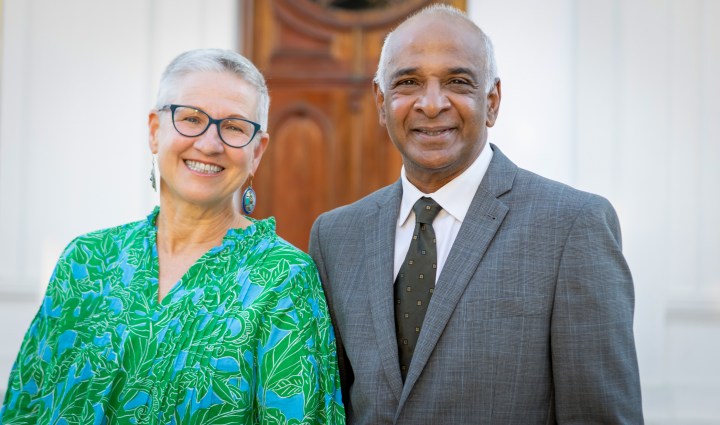HUMAN RIGHTS LECTURE
Future of SA’s democratic society depends on overcoming poverty and inequality – Justice Jody Kollapen

‘Today, no one can explain the longevity of apartheid. In time, future generations will ask… how could a society with a history such as ours, armed with the Constitution that we have and acutely aware of the dire consequences inequality and poverty hold for our future, have allowed poverty and inequality to endure for so long?’ – Constitutional Court Justice Narandran Jody Kollapen
Overcoming poverty and inequality is not just a matter of statistics but a factor on which the future and sustainability of South Africa’s democratic society depends. Inequality in the country has deepened over the past 30 years, with an estimated 25% of the population experiencing food poverty and close to 50% living in poverty.
This was the view shared by Constitutional Court Justice Narandran Jody Kollapen in the 18th Annual Human Rights Lecture at Stellenbosch University (SU) on Tuesday, 19 March. The topic was “Realising Socioeconomic Rights in an Unequal Society”.
“As we commence the fourth decade of democracy, we must build on the foundations that have thus far been laid, mindful of the substantial work that lies ahead, and cognisant of the myriad consequences that inequality and poverty hold for our constitutional democracy. This is a joint responsibility we share as people of this country,” he said.
Kollapen has a long history of defending human rights in South Africa’s courts. Over the course of his career he has worked for the NGO Lawyers for Human Rights and has served on the South African Human Rights Commission. He was a judge in the Gauteng Division of the High Court for 11 years, before permanent appointment to the Constitutional Court in 2022.
Read more in Daily Maverick: Judges Jody Kollapen and Steven Mathopo appointed to Constitutional Court
“Justice Kollapen’s inspirational career is an example of the many and varied routes one can follow to pursue a career in human rights law – as a practising attorney in private practice, working for many civil society organisations; playing a role in a Chapter 9 institution; and serving as adviser for many international… and African commission agencies. And then of course… hopefully treading a line from the High Court to the highest court in the land, at the Constitutional Court,” Professor Sandra Liebenberg, the HF Oppenheimer Chair in Human Rights Law at SU, said on Tuesday.
Pursuing substantive equality
Kollapen spoke about the idea that for transformation to be meaningful, it must encompass not only the provision of services but also the levelling of the “economic playing fields” that were skewed during apartheid. However, he added that existing institutional arrangements could be barriers to equality and eradicating poverty, since it was in these areas that both power and inequalities reproduced themselves.
“Sometimes we battle to reach those places, and even when we reach those places, we battle to make the changes that are needed. And to some extent, it may be partly due to the absence of a social pact when we adopted the Constitution,” Kollapen continued.
“Former Deputy Chief Justice Dikgang Moseneke, in his book My Own Liberator, makes the point. He said that we reached an agreement on the kind of society we wanted, the society committed to equality and social justice. But we never reached an agreement on a social pact as to what we would need to do to get there; what we would need to do to the economy in order to get there [and] what we needed to do to the uneven playing fields to get there. He calls this an important omission.”
The equality provisions in the Constitution speak to a substantive notion of equality, according to Kollapen. When dealing with equality claims in courts, it was therefore necessary to scrutinise the situation of the complainants in society, including their history and vulnerability.
Human rights and claims to enforce them do not play themselves out on some stark and sterile playing field.
“Courts have particular scrutiny in cases which involve material inequalities. They must drill deep down to understand how patterns of inequality came into existence, how they were sustained and their effect on individuals and groups in society. Their responsibility is not only to address the effects of inequality but also its root causes. This is what redistributive equality would require of us.”
Kollapen made the example of a case, Social Justice Coalition v Minister of Police, where a model used by the SAPS to allocate police resources was found to discriminate on the basis of race and poverty, even though it was based on what appeared to be objective criteria. The SAPS used the incidence of reported crime to determine resource allocation. However, research found that crime in black communities in the Western Cape was underreported for various historical reasons, including loss of confidence in the police and underperforming police stations.
Courts might have a vital role to play as the ultimate authority to determine whether we comply or not with the Constitution.
He noted that “while courts must bring a sharp mind and a searing scrutiny to bear on equality claims, they are not the primary drivers of achieving equality. That is the responsibility of the whole of government and society.”
Reflecting on socioeconomic rights, Kollapen noted that they were included in the Constitution in recognition of the fact that the foundation of the democratic project would depend on how it affected the material conditions of life for members of society, including access to housing, food, water and education. He emphasised that rights didn’t exist in isolation but in relation to each other.
“A transformative jurisprudence requires judicial officers and practitioners to bring that broad understanding to this very important aspect of our work. Who is asserting the right, and under what circumstances? These are critical questions – human rights and claims to enforce them do not play themselves out on some stark and sterile playing field,” he said.
“For example, housing programmes in their conception and execution must have regard to groups that have been marginalised and excluded. What is delivered must cater adequately and equally for such needs, such as those living with disabilities, new and different notions of the family, single parents and the interests and the equality rights of the LGBTQI community.”
Role of the courts
Courts have come to play a more far-reaching role in many areas of life than expected at the inception of South Africa’s democracy, observed Kollapen. In those instances where democratic processes fail to yield results, courts are required to adjudicate the resultant disputes.
“Courts are often required to review and assess policymaking, lawmaking and programme implementation measures. It is in that space that the role and the expertise of other organs of state require proper recognition, that the available resources of the state and its other priorities require proper consideration,” he said.
“It may well be that sometimes it is appropriate to leave the question to the policy discretion of the executive or legislative arms of government, whilst in other cases the nature of the rights violation and constitutional values at stake may cry out for a judicial remedy.”
Looking ahead, he noted that courts might have a vital role to play as the “ultimate authority to determine whether we comply or not with the Constitution”.
“This is a role that is not carved out [by] ourselves but one that the Constitution provides for. I am confident that we can continue to discharge that role in the true spirit of what transformation requires, mindful of the limits of our powers,” he said. DM




















 Become an Insider
Become an Insider
The core issue is not the constitution and equality of outcome, but the proper management of state resources, especially state finances.
The role of the courts is critical, but they are being undermined by poor policing, an under resourced and politicised NPA and delaying tactics by lawyers – the infamous “Stalingrad” strategy , epitomised by former president Zuma’s legal counsel, Dali Mpofu.
Very few of the ANC members suspected of corruption and named in the Zondo report have been brought to book. President Ramaphosa is under a cloud regarding his buffalo transaction.
We need less talking and more walking if we want to be optimistic about the future of the equal application of the rule of law in South Africa!
As long as the anc governmunt is in power there will be only an APPEARANCE of demokrissy .
I’m certain the event snacks were as beautiful as the words.
Get a grip people!
Let’s say the top ten wealthiest people in SA are worth R400 billion. OK, so we split that out socially at R6k per person. Lekker but consider that is less than two months of minimum wage. Month 3 : gone. Next up we go for the next 90 wealthiest persons and again we redistribute a few weeks of minimum wage. You have changed nothing. You can redistribute until we are all poor. The law of big numbers when you look at total economies make individual wealth, however obscene one person having R50 billion may sound, irrelevant.
We have to fix the big machine not the sideshow of inequality.